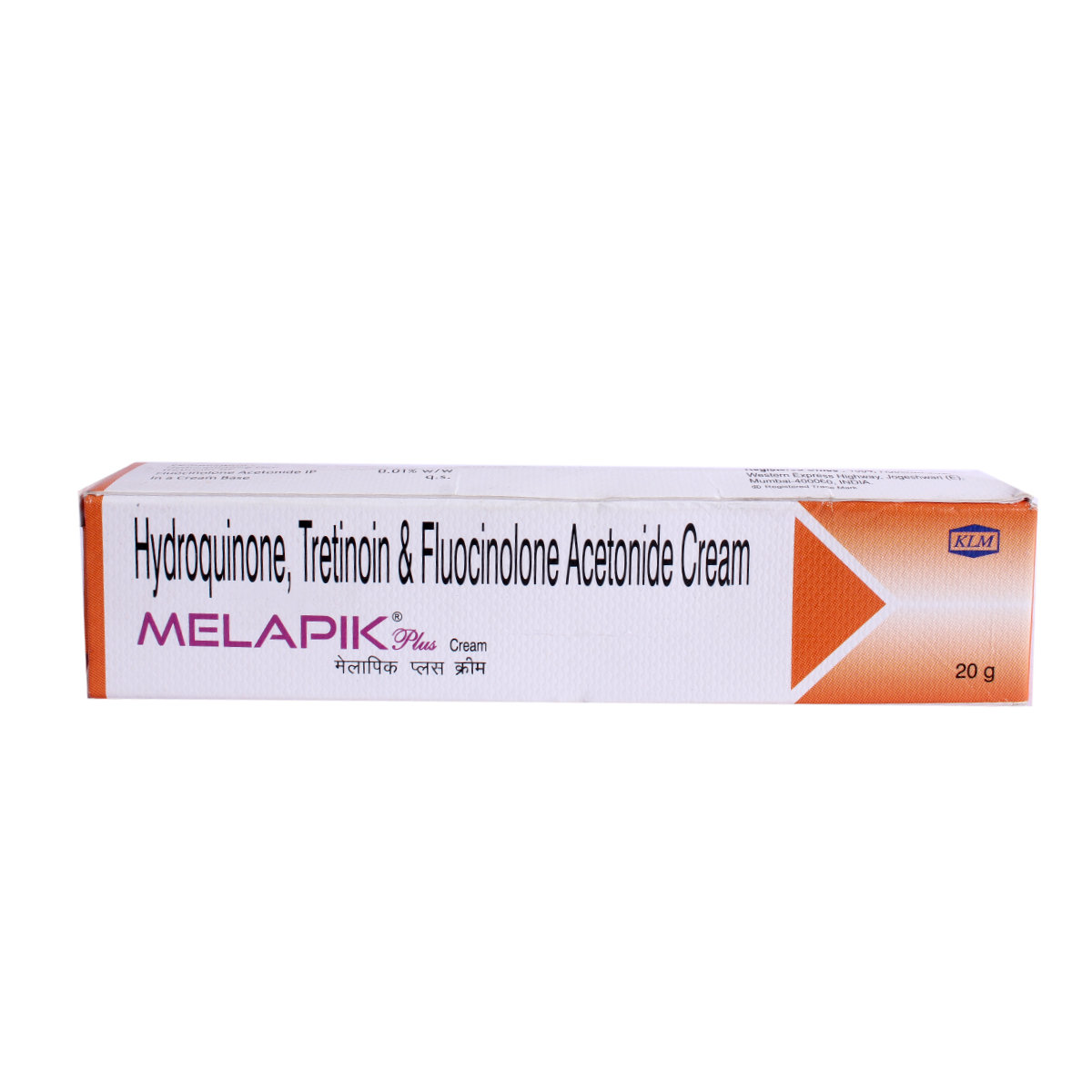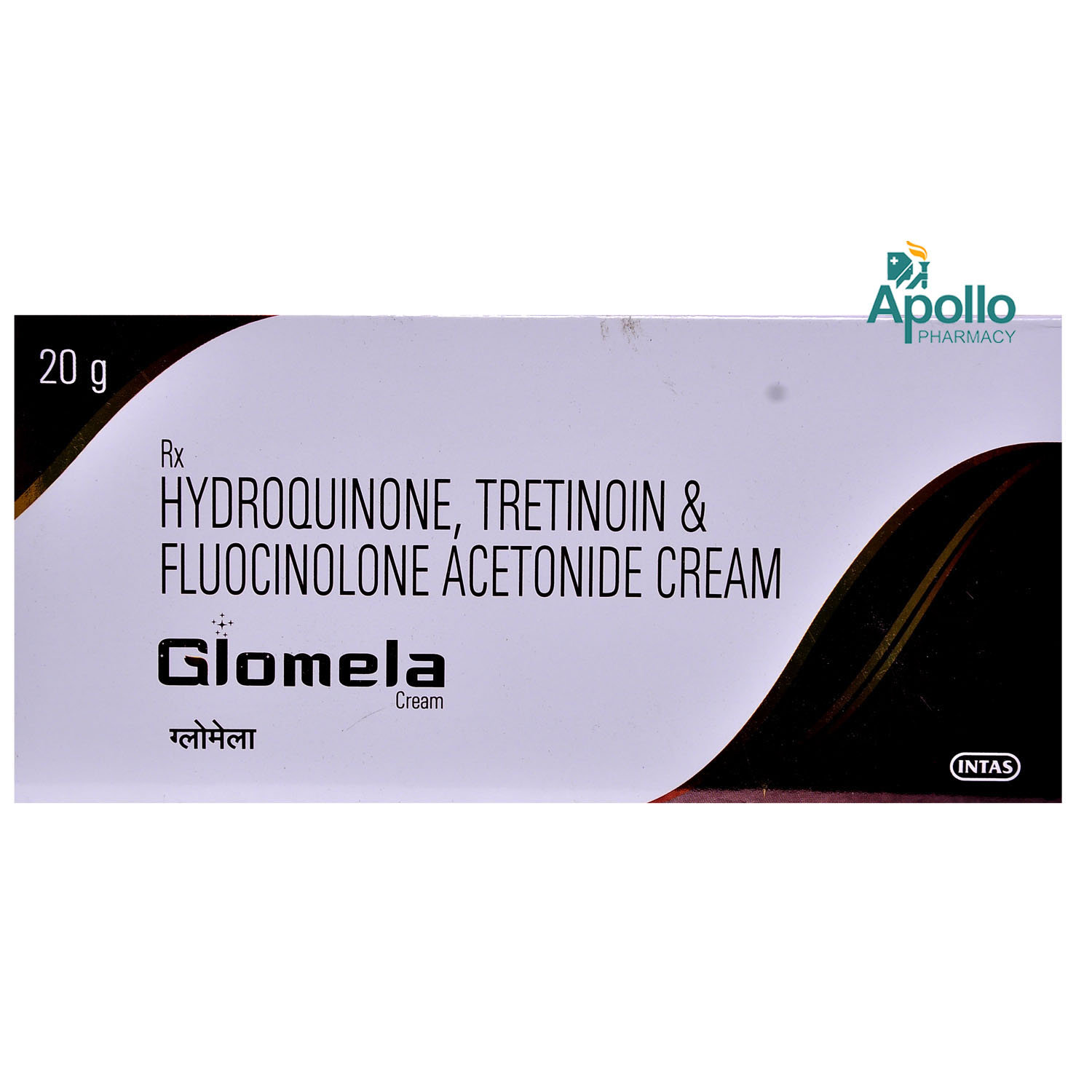Spotlite Cream


MRP ₹199
(Inclusive of all Taxes)
₹29.9 Cashback (15%)
Provide Delivery Location
Online payment accepted
 Prescription drug
Prescription drugWhats That
About Spotlite Cream
Spotlite Cream is a skin-related medication primarily used to treat melasma (dark brown patch on skin). Melasma is also known as chloasma or mask of pregnancy, is a common skin condition that causes brown patches on the face. It is more common in women than in men. The discoloured (grey-brown) patches occur mostly on the forehead, chin, nose and cheeks.
Spotlite Cream contains three medicines, namely: Fluocinolone acetonide (steroid), Hydroquinone (skin lightening or bleaching agent), and Tretinoin (a form of Vitamin A or retinoids). Fluocinolone acetonide is a steroid that blocks the production of certain chemical messengers (prostaglandins) that make the skin red, swollen, and itchy. Hydroquinone belongs to the class of skin lightening agents that works by decreasing the amount of melanin (a skin pigment) that is responsible for the darkening of the skin. Tretinoin belongs to the class of retinoids (man-made vitamin A) that works by increasing the renewal of skin cells, which helps in the natural exfoliation of skin’s outer layers.
Spotlite Cream is only for external use. Avoid contact of Spotlite Cream with nose, mouth, eyes, ears, or vagina. Do not apply on a cut, open wound, or burnt skin area. In case Spotlite Cream comes in contact with these areas accidentally, rinse with water thoroughly. Some people may experience application site reactions (burning, irritation, itching, and redness). Most of these side effects of Spotlite Cream do not require medical attention and gradually resolve over time. However, if the side effects persist or worsen, please consult your doctor.
If you are allergic to Spotlite Cream or any other medicines, please tell your doctor. If you are pregnant, nursing mother or planning for pregnancy, it is advised to consult a doctor before using Spotlite Cream. Spotlite Cream is not recommended for children below 12 years of age. Do not apply Spotlite Cream on ulcerated skin or wounds. Avoid sun exposure while using Spotlite Cream as it may make the skin more sensitive to sunlight and cause sunburn. Wear protective clothing and use sunscreen while going out to protect your skin from sunburn. Do not cover or wrap the treated area with a bandage unless advised by your doctor. Avoid smoking or going near naked flames as the fabric (bedding, clothing, dressings) that is in contact with Spotlite Cream catches fire and burns easily. If you have a sulfite allergy, asthma, have rosacea (redness and often red, small, pus-filled bumps on the face), acne, skin thinning, perioral dermatitis (redness and swelling of the skin around the mouth), genital itching, chickenpox, diabetes, cold sores, ulcerated skin, warts, shingles (a viral infection causing painful rash), eczema (itchy, swelling of the skin) or any other skin condition, diabetes, Cushing syndrome, glucosuria, inform your doctor before taking Spotlite Cream.
Uses of Spotlite Cream
Directions for Use
Medicinal Benefits
Spotlite Cream contains three medicines, namely: Fluocinolone acetonide (steroid), Hydroquinone (skin lightening or bleaching agent) and Tretinoin (a form of Vitamin A or retinoids) used to treat melasma. Fluocinolone acetonide is a steroid that blocks the production of certain chemical messengers (prostaglandins) that make the skin red, swollen and itchy. Hydroquinone belongs to the class of skin lightening agents that works by decreasing the amount of melanin (a skin pigment) that is responsible for the darkening of the skin. Tretinoin belongs to the class of retinoids (man-made vitamin A) that works by increasing the renewal of skin cells, which helps in the natural exfoliation of skin’s outer layers.
Storage
- Consult your doctor if you experience skin redness, itching, or irritation after taking medication.
- Your doctor may adjust your treatment plan by changing your medication or providing guidance on managing your erythema symptoms.
- Your doctor may recommend or prescribe certain medications to help alleviate symptoms.
- Apply cool compresses or calamine lotion to the affected skin area to reduce redness and itching.
- Stay hydrated by drinking plenty of water to help alleviate symptoms and keep your skin hydrated.
- Monitor your skin condition closely and promptly report any changes, worsening symptoms, or concerns to your healthcare provider.
- Moisturize frequently with thick, broad-spectrum moisturizers containing sunscreen.
- Use warm water for short baths, and gentle cleansers.
- Pat dry and apply moisturizer immediately.
- Use a humidifier to add moisture to the air, and choose breathable fabrics like cotton and silk.
- Wash clothes with fragrance-free detergents to minimize irritation.
- Report the itching to your doctor immediately; they may need to change your medication or dosage.
- Use a cool, damp cloth on the itchy area to help soothe and calm the skin, reducing itching and inflammation.
- Keep your skin hydrated and healthy with gentle, fragrance-free moisturizers.
- Try not to scratch, as this can worsen the itching and irritate your skin.
- If your doctor prescribes, you can take oral medications or apply topical creams or ointments to help relieve itching.
- Track your itching symptoms and follow your doctor's guidance to adjust your treatment plan if needed. If the itching persists, consult your doctor for further advice.
- Burning sensation is an abnormal side effect that needs medical attention. To relieve the burning feeling, your doctor may prescribe painkillers or antidepressants.
- Focused exercises can improve strength and reduce burning by soothing muscles.
- Change in lifestyle and improving nutrition can reduce the causes of burning sensation and provide relief.
- Your doctor may suggest nerve block injections as it is related to sensation in the skin.
- Burning feeling in a specific area would need mild electrical currents to reduce pain that targets the nerve affected. This practice must be done only if your doctor mentions it.
- Keep your skin clean by gently washing your face two times daily and after sweating. Choose a mild and non-abrasive cleanser.
- Use gentle alcohol-free skin care products. Avoid products that might irritate your skin such as exfoliants, astringents and toners.
- Acne may also occur due to oil in the hair. Thus, if you have oily hair, shampoo more frequently than you do now and keep your hair away from face.
- Keep your hands off your face as touching face throughout the day might worsen acne. Also, do not pick, squeeze or pop acne as it will prolong the healing process and increase the risk of dark spots and scarring.
- Avoid tanning by applying a broad spectrum sunscreen and wearing sun-protective clothing when outdoors.
Drug Warnings
If you are allergic to Spotlite Cream or any other medicines, please tell your doctor. If you are pregnant, nursing mother, or planning for pregnancy, it is advised to consult a doctor before using Spotlite Cream. Spotlite Cream is not recommended for children below 12 years of age. Do not apply Spotlite Cream on ulcerated skin or wounds. Avoid sun exposure while using Spotlite Cream as it may make the skin more sensitive to sunlight and cause sunburn. Do not cover or wrap the treated area with a bandage unless advised by your doctor. Avoid smoking or going near naked flames as the fabric (bedding, clothing, dressings) that is in contact with Spotlite Cream catches fire and burns easily. If you have a sulfite allergy, asthma, have rosacea (redness and often red, small, pus-filled bumps on the face), acne, skin thinning, perioral dermatitis (redness and swelling of the skin around the mouth), genital itching, chickenpox, diabetes, cold sores, ulcerated skin, warts, shingles (a viral infection causing painful rash), eczema (itchy, swelling of the skin) or any other skin condition, diabetes, Cushing syndrome, glucosuria, inform your doctor before taking Spotlite Cream. inform your doctor before taking Spotlite Cream.
Drug-Drug Interactions
Drug-Drug Interactions
Login/Sign Up
Drug-Food Interactions
Drug-Food Interactions
Login/Sign Up
Diet & Lifestyle Advise
- Avoid sun exposure while using Spotlite Cream as it may make the skin more sensitive to sunlight and cause sunburn. Wear protective clothing and use sunscreen while going out to protect your skin from sunburn.
- Regular exercise can improve your mood and self-esteem though it doesn’t clear spots. Take a shower immediately after finishing the exercise.
- Wear a wide-brimmed hat to protect your face from sun exposure.
- Avoid using skin products that cause irritation such as skin cleansers or shampoos, harsh soaps, hair removers or waxes, hair colours or permanent chemicals, skin products with astringents, lime, spices, or alcohol.
Side Effects of Spotlite Cream
- Burning
- Irritation
- Itching
- Redness
Habit Forming
Therapeutic Class
All Substitutes & Brand Comparisons
RX
Retop Lite Cream
₹120
(₹5.4/ 1gm)
54% CHEAPERRX
U-B Fair Cream 30 gm
Torque Pharmaceuticals Pvt Ltd
₹199
(₹5.84/ 1gm)
51% CHEAPERRX
Hydrip Plus Cream
Tripada Biotec Pvt Ltd
₹160
(₹7.2/ 1gm)
39% CHEAPER
Product Substitutes
Drug-Diseases Interactions
Drug-Diseases Interactions
Login/Sign Up
FAQs
Spotlite Cream contains three medicines, namely: Fluocinolone acetonide (steroid), Hydroquinone (skin lightening or bleaching agent), and Tretinoin (a form of Vitamin A or retinoids). Fluocinolone acetonide is a steroid that blocks the production of certain chemical messengers (prostaglandins) that make the skin red, swollen, and itchy. Hydroquinone belongs to the class of skin lightening agents that works by decreasing the amount of melanin (a skin pigment) that is responsible for the darkening of the skin. Tretinoin belongs to the class of retinoids (man-made vitamin A) that works by increasing the renewal of skin cells, which helps in the natural exfoliation of skin’s outer layers.
Spotlite Cream causes common side effects at application site reactions (burning, irritation, itching, and redness). Most of these side effects of Spotlite Cream do not require medical attention and gradually resolve over time. However, if the side effects persist or worsen, please consult your doctor.
Yes, Spotlite Cream may increase the skin sensitivity to sunlight in the treated areas. Therefore, avoid or limit exposure to sunlight and sunlamps. You are advised to use sunscreen and wear protective clothing while going out to prevent sunburn.
Yes, Spotlite Cream may cause skin irritation, burning sensation, or itching at the site of application in rare cases. However, if the irritation persists or worsens, stop using Spotlite Cream and consult a doctor.
You are recommended to use Spotlite Cream for as long as your doctor has prescribed it. However, avoid using Spotlite Cream for more than 6 to 8 weeks without a doctor’s advice.
Special Advise
- Avoid using Spotlite Cream for more than 6-8 weeks without a doctor’s advice.
- Please consult a dermatologist if the skin condition does not improve after 2-3 months of treatment with Spotlite Cream.
- Do not take Spotlite Cream by mouth. Spotlite Cream is for use only on the skin (topical use). Accidently if Spotlite Cream gets in your eyes or mouth, immediately rinse with cold water.
- Do not take Spotlite Cream if you allergic sulfa containing medicines and have asthma. It is better to contact a doctor in these conditions and take Spotlite Cream.
Disease/Condition Glossary
Melasma: It is also known as chloasma, a common skin condition that causes brown patches on the face. The discoloured (grey-brown) patches occur mostly on the forehead, chin, nose, and cheeks. Melasma may be caused due to sun exposure, hormone therapy, pregnancy, birth control pills, thyroid or even stress. It is more common in women than in men. It may occur in pregnant women, due to hormonal changes during pregnancy and is called a ‘mask of pregnancy and fades away after pregnancy on its own or after stopping usage of contraceptive pills. It can be treated by using skin-lightening creams, topical steroids, dermabrasion or chemical peels.

Have a query?
Alcohol
Caution
The interaction of alcohol with Spotlite Cream is unknown. Please consult a doctor before consuming alcohol while using Spotlite Cream.
Pregnancy
Caution
The safety of Spotlite Cream in pregnant women is unknown and is given to a pregnant woman only if the doctor thinks benefits outweigh risks.
Breast Feeding
Caution
It is unknown whether Spotlite Cream is excreted in human milk. Please consult a doctor before using Spotlite Cream while breastfeeding.
Driving
Caution
Spotlite Cream usually does not affect your ability to drive or operate machinery.
Liver
Caution
If you have any concerns regarding the use of Spotlite Cream in patients with liver problems, please consult a doctor.
Kidney
Caution
If you have any concerns regarding the use of Spotlite Cream in patients with kidney problems, please consult a doctor.
Children
Unsafe
Spotlite Cream is not recommended for children below 12 years of age, as the safety and effectiveness were not established.







